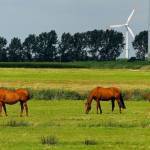Keep Horses Comfortable and Healthy in Hot Weather

The long, hot days of summer are just as hard on horses as they are on people who work outdoors. Basic management steps can help horses stay as comfortable as possible.
- Be sure fresh water is always available. Provide at least 10 to 12 gallons per idle horse per day, though unlimited access is ideal. Nursing mares and exercising horses will need more water.
- Check water tanks or buckets frequently and replace water that has become too warm. Empty, clean, and refill water containers that have accumulated grass, hay, or dirt when horses drink.
- Give horses access to shade. Natural shade from trees or hills is fine if your field has these features. Otherwise, you can build a run-in shed, preferably with windows or removable sidewalls, or keep horses in a well-ventilated barn during the hottest part of the day. Open doors and windows to allow a regular flow of air. Properly installed overhead fans (at least ten feet above the floor) in sheds and stalls will keep the air moving and are safer than stall-front fans that may present a fire hazard.
- Use high-quality electrolytes to replace minerals lost in sweat. Exercising horses may need more than idle horses, but all horses may benefit from at least a low daily dose during hot and humid weather.
- Plan exercise for the coolest part of the day, most likely in early morning. Keep an eye on sweating and willingness to exercise; some horses may work to the point of discomfort or even exhaustion if the rider continues to ask for prolonged performance.
- Hose horses with cold water after exercise. Remove the water with a sweat scraper and apply more cold water, alternating hosing and scraping until the horse is cooled.
- Horses with white or light-colored coats may become sunburned, especially on the face and muzzle. Before the sunburn occurs, use extended fly masks or sunblock to prevent it.
- Hot weather is fly season. Use fly spray or fly nets, or keep horses in their stalls with fans to keep the air moving and discourage flies. Keep stalls clean and manure hauled away to minimize fly problems.
- Some horses may need extra care in the summer. Submissive horses may need their own water buckets so that dominant horses can’t block access. Thick-coated horses and those with Cushing’s disease will be more comfortable if they are clipped as needed.
- All horses may need to have extra hay provided as cool-season grasses die back and pasture growth thins out.








